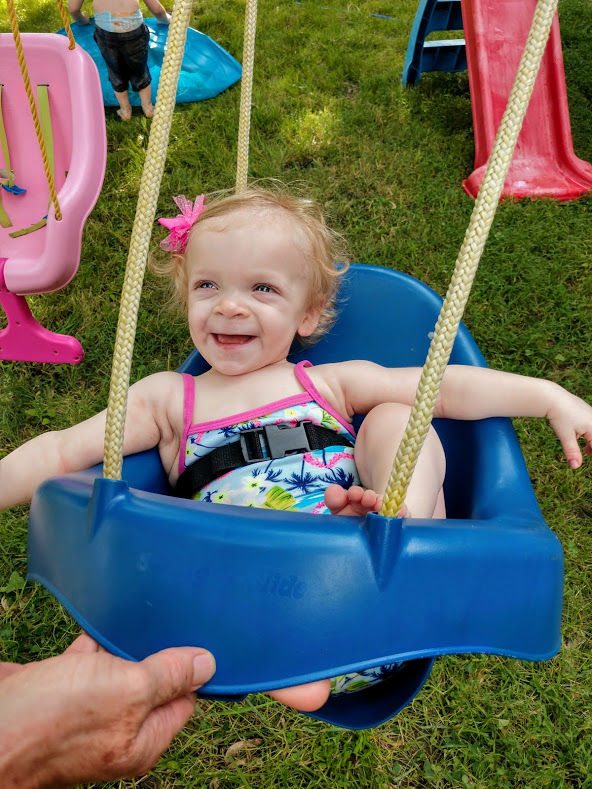The story of Oakley
Hello, this is our daughter, Oakley, and she has been diagnosed with Nicolaides-Baraitser Syndrome.
When I was pregnant with Oakley, we knew we wanted to choose a good, strong name for her. We chose Oakley Annabelle, like Annie Oakley. 🙂
Everything was going well through pregnancy and delivery. She did seem to develop a little more slowly than average. Our daycare provider recommended we get ahold of Infant-Toddler Services to work with her because of her developmental delays. We started at around 9 months with Physical Therapy because she wasn’t sitting up on her own yet. We started weekly but as she made progress we gradually changed to monthly visits. When it came time for her 18-month check-up we asked to be referred to a Neurologist because she still wasn’t walking yet and her speech was mostly babbling. The Neurologist did developmental testing and said that she had global developmental delay. She did not appear to have Autism due to her very social personality. She ran a Thyroid Panel, Metabolic Panel, and did blood testing and the first round of genetic testing. She also had an ultrasound of her soft spot done because it had not closed fully. All of that came back normal so she ordered an MRI to see if it was a structural issue. I was convinced it was a thyroid issue due to her symptoms such as an umbilical hernia, delayed tooth eruption, developmental delays, and dry skin and hair. She ran more thyroid testing and a more in-depth genetic test. After about 3 months we finally got the genetic testing report.
We were told that Oakley has a mutation in the SMARCA-2 gene and PUM1. After our consult with the Neurologist, we learned that the mutation in the PUM1 gene does not seem to be significant. The mutation in SMARCA-2 (Nicolaides-Baraitser Syndrome) matches up with almost all of her symptoms. We learned that there is very little information on this syndrome and there are less than 100 diagnosed cases worldwide. There is a Facebook page for families with children that have NCBRS and it has been amazing. It has helped tremendously because we can ask the other families what they have gone through and get advice from people going through the same thing.
NCBRS can cause developmental delays, epilepsy, short stature, sparse hair, and from the research so far, does not seem to affect life expectancy. Oakley is a very happy child which seems to be true of most of the children (and adults) with NCBRS. She seems to be very healthy for the most part. She loves to snuggle but is definitely ornery! 🙂
Since being diagnosed, we are working on starting more physical therapy, speech therapy, and hopefully soon will be meeting with a genetic counselor. It is definitely going to be a journey but Oakley and her mischievious smile and sweet personality makes it hard to be anything but positive!
